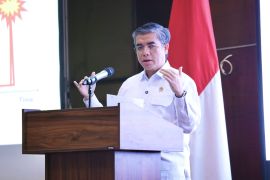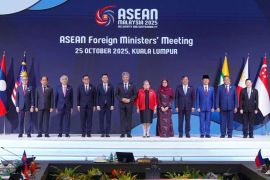Some of the global economic issues that need close attention are the decline of China`s economy, a global economic slowdown and an improving U.S. economy.Jakarta (ANTARA News) - International Monetary Fund (IMF) Chief, Christine Lagarde, said she believed Indonesia will be able to handle the current economic challenges well.
"The development of the global economic condition still remains worrisome, but Indonesia has enough experience to deal with it," she said during a general lecture at the State Indonesia University on Tuesday.
Lagarde added that Indonesias economic growth rate had dropped below 5 percent, but she believed it would not last permanently, "if Indonesia develops new sources of economic growth, based on the existing potential and through correct policy management."
She noted that Indonesia had to closely monitor the current global economy, which is currently facing numerous problems that could affect developing countries, including Indonesia.
Some of the global economic issues that need close attention are the decline of Chinas economy, a global economic slowdown and an improving U.S. economy.
"They will all affect other economies, including Indonesia and so Indonesia must adopt anticipatory measures to deal with these changes," she said.
Lagarde also pointed out that Chinas economy was in a transitional period for which it had to make adjustments to transform itself into a market-based economy by adopting a new growth model. Chinas growth rate is also expected to slow down, but it has instruments and enough financial power to manage the transition.
"However, Indonesia as one of Chinas main trading partners must face the challenges that emerge out of this transition process," the IMF Chief said.
Lagarde said the prices of commodities had slumped to lows and are projected to remain at this level, which means external demand for Indonesian commodities would still be weak.
She said Indonesia needed to anticipate the U.S. economic recovery, which will result in the U.S. Federal Reserve raising interest rates and this in turn will further fuel the global financial volatility.(*)
Editor: Heru Purwanto
Copyright © ANTARA 2015











